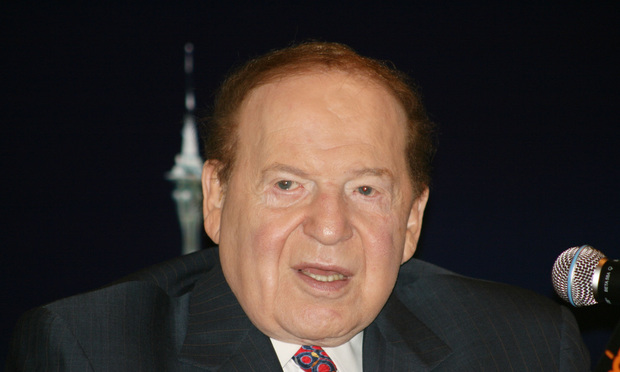Sheldon Adelson Can't Dismiss Jewish Group's Suit for Damages Stemming From Defamation Suit
U.S. District Judge J. Paul Oetken of the Southern District of New York said that Sheldon Adelson was responsible for compensatory damages and attorney fees under the Nevada's anti-strategic lawsuit against public participation statute.
September 30, 2019 at 06:42 PM
4 minute read
 Sheldon Adelson
Sheldon Adelson
Sheldon Adelson lost his bid on Monday to dismiss a lawsuit from the National Jewish Democratic Council accusing the Republican mega-donor and casino magnate of waging a yearslong campaign of "legal sadism" in pressing a defamation suit that was ultimately dismissed under Nevada's anti-SLAPP law.
U.S. District Judge J. Paul Oetken of the Southern District of New York said that Adelson was responsible for compensatory damages and attorney fees under Nevada's anti–strategic lawsuit against public participation statute, which blocks litigation meant to intimidate individuals for their involvement in public affairs.
Oetken, however, denied the NJDC's motion for summary judgment on punitive damages, saying the issue required a response from Adelson.
The suit for damages stemmed from the NJDC's call during the 2012 presidential campaign that encouraged candidate Mitt Romney to stop accepting contributions from Adelson, claiming that the wealthy businessman had "personally approved" of prostitution in his casinos.
At the time, Adelson was ranked by Forbes as the world's 16th-richest man, with a fortune of $43 billion, and according to the complaint, had unleashed a torrent of threats against the NJDC, including a vow to "bankrupt" the organization.
The NJDC eventually removed the petition from its website, but denied having participated in any character assassination against Adelson.
Adelson sued the council, a nonprofit that aims to maximize Jewish support for Democratic candidates running for political office, and its former chairman, Marc Stanley, in 2013. Oetken dismissed the defamation suit under Nevada's anti-SLAPP law in a decision that was later upheld by the U.S. Court of Appeals in 2017, following a certification of questions to the Nevada Supreme Court.
NJDC responded with its own lawsuit in Manhattan federal court last September. The group claimed in the complaint that it was "in tatters, barely functioning," and that Stanley was still "reeling from the public relations fallout" that resulted from "Adelson's onslaught."
According to court documents, Adelson argued that the damages lawsuit itself was protected under Nevada law and that application of the statute would violate the Supremacy Clause of the U.S. Constitution.
But Oetken, in a 24-page opinion, said Adelson's argument was "fundamentally flawed" because Adelson's original defamation action was subject to Nevada's anti-SLAPP statute, which includes a provision for damages.
"Thus, a federal court sitting in diversity must apply it," Oetken wrote.
"In short, Adelson—by invoking this Court's diversity jurisdiction—must take Nevada law as he finds it," Oetken said. "The anti-SLAPP statute's damages provision, much like its requirement of dismissal or its fee-shifting provision, is part of the substantive law of Nevada. This court works no injury to the supremacy of federal law by applying it."
While the council won its summary judgment motion for compensatory damages and fees, Oetken said such a motion for punitive damages was premature, and required a showing that Adelson had acted with "oppression, fraud, or malice."
The sides were ordered to confer and report back to the court in three weeks regarding further proceedings in the case.
An attorney for Adelson was not immediately available to comment, and counsel for the NJDC did not immediately return a call Monday afternoon seeking comment on the ruling.
The NJDC is represented by Richard D. Emery, Ashok Chandran and Ogilvie Andrew Fraser Wilson of Emery Celli Brinckerhoff & Abady.
Adelson is represented by Lee A. Armstrong, Michael A. Carvin and James Matthew Gross of Jones Day.
The case is captioned National Jewish Democratic Council v. Adelson.
Read More:
Adelson Libel Suit Over Use of Hyperlink Is Dismissed
Casino Magnate Adelson Loses Appeal of Federal Defamation Suit
Proposed Reform to New York's Anti-SLAPP Laws May Bring Big Changes
This content has been archived. It is available through our partners, LexisNexis® and Bloomberg Law.
To view this content, please continue to their sites.
Not a Lexis Subscriber?
Subscribe Now
Not a Bloomberg Law Subscriber?
Subscribe Now
NOT FOR REPRINT
© 2025 ALM Global, LLC, All Rights Reserved. Request academic re-use from www.copyright.com. All other uses, submit a request to [email protected]. For more information visit Asset & Logo Licensing.
You Might Like
View All

Courts Beginning to Set Standards for Evidence Relying Upon Artificial Intelligence
4 minute read
NY Judge Admonished Over Contributions to Progressive Political Causes

Attorneys ‘On the ‘Move: Morrison Cohen Expands White Collar Practice; O’Melveny Brings Back Corporate Finance Partner
6 minute readTrending Stories
- 1'It's Not Going to Be Pretty': PayPal, Capital One Face Novel Class Actions Over 'Poaching' Commissions Owed Influencers
- 211th Circuit Rejects Trump's Emergency Request as DOJ Prepares to Release Special Counsel's Final Report
- 3Supreme Court Takes Up Challenge to ACA Task Force
- 4'Tragedy of Unspeakable Proportions:' Could Edison, DWP, Face Lawsuits Over LA Wildfires?
- 5Meta Pulls Plug on DEI Programs
Who Got The Work
Michael G. Bongiorno, Andrew Scott Dulberg and Elizabeth E. Driscoll from Wilmer Cutler Pickering Hale and Dorr have stepped in to represent Symbotic Inc., an A.I.-enabled technology platform that focuses on increasing supply chain efficiency, and other defendants in a pending shareholder derivative lawsuit. The case, filed Oct. 2 in Massachusetts District Court by the Brown Law Firm on behalf of Stephen Austen, accuses certain officers and directors of misleading investors in regard to Symbotic's potential for margin growth by failing to disclose that the company was not equipped to timely deploy its systems or manage expenses through project delays. The case, assigned to U.S. District Judge Nathaniel M. Gorton, is 1:24-cv-12522, Austen v. Cohen et al.
Who Got The Work
Edmund Polubinski and Marie Killmond of Davis Polk & Wardwell have entered appearances for data platform software development company MongoDB and other defendants in a pending shareholder derivative lawsuit. The action, filed Oct. 7 in New York Southern District Court by the Brown Law Firm, accuses the company's directors and/or officers of falsely expressing confidence in the company’s restructuring of its sales incentive plan and downplaying the severity of decreases in its upfront commitments. The case is 1:24-cv-07594, Roy v. Ittycheria et al.
Who Got The Work
Amy O. Bruchs and Kurt F. Ellison of Michael Best & Friedrich have entered appearances for Epic Systems Corp. in a pending employment discrimination lawsuit. The suit was filed Sept. 7 in Wisconsin Western District Court by Levine Eisberner LLC and Siri & Glimstad on behalf of a project manager who claims that he was wrongfully terminated after applying for a religious exemption to the defendant's COVID-19 vaccine mandate. The case, assigned to U.S. Magistrate Judge Anita Marie Boor, is 3:24-cv-00630, Secker, Nathan v. Epic Systems Corporation.
Who Got The Work
David X. Sullivan, Thomas J. Finn and Gregory A. Hall from McCarter & English have entered appearances for Sunrun Installation Services in a pending civil rights lawsuit. The complaint was filed Sept. 4 in Connecticut District Court by attorney Robert M. Berke on behalf of former employee George Edward Steins, who was arrested and charged with employing an unregistered home improvement salesperson. The complaint alleges that had Sunrun informed the Connecticut Department of Consumer Protection that the plaintiff's employment had ended in 2017 and that he no longer held Sunrun's home improvement contractor license, he would not have been hit with charges, which were dismissed in May 2024. The case, assigned to U.S. District Judge Jeffrey A. Meyer, is 3:24-cv-01423, Steins v. Sunrun, Inc. et al.
Who Got The Work
Greenberg Traurig shareholder Joshua L. Raskin has entered an appearance for boohoo.com UK Ltd. in a pending patent infringement lawsuit. The suit, filed Sept. 3 in Texas Eastern District Court by Rozier Hardt McDonough on behalf of Alto Dynamics, asserts five patents related to an online shopping platform. The case, assigned to U.S. District Judge Rodney Gilstrap, is 2:24-cv-00719, Alto Dynamics, LLC v. boohoo.com UK Limited.
Featured Firms
Law Offices of Gary Martin Hays & Associates, P.C.
(470) 294-1674
Law Offices of Mark E. Salomone
(857) 444-6468
Smith & Hassler
(713) 739-1250






